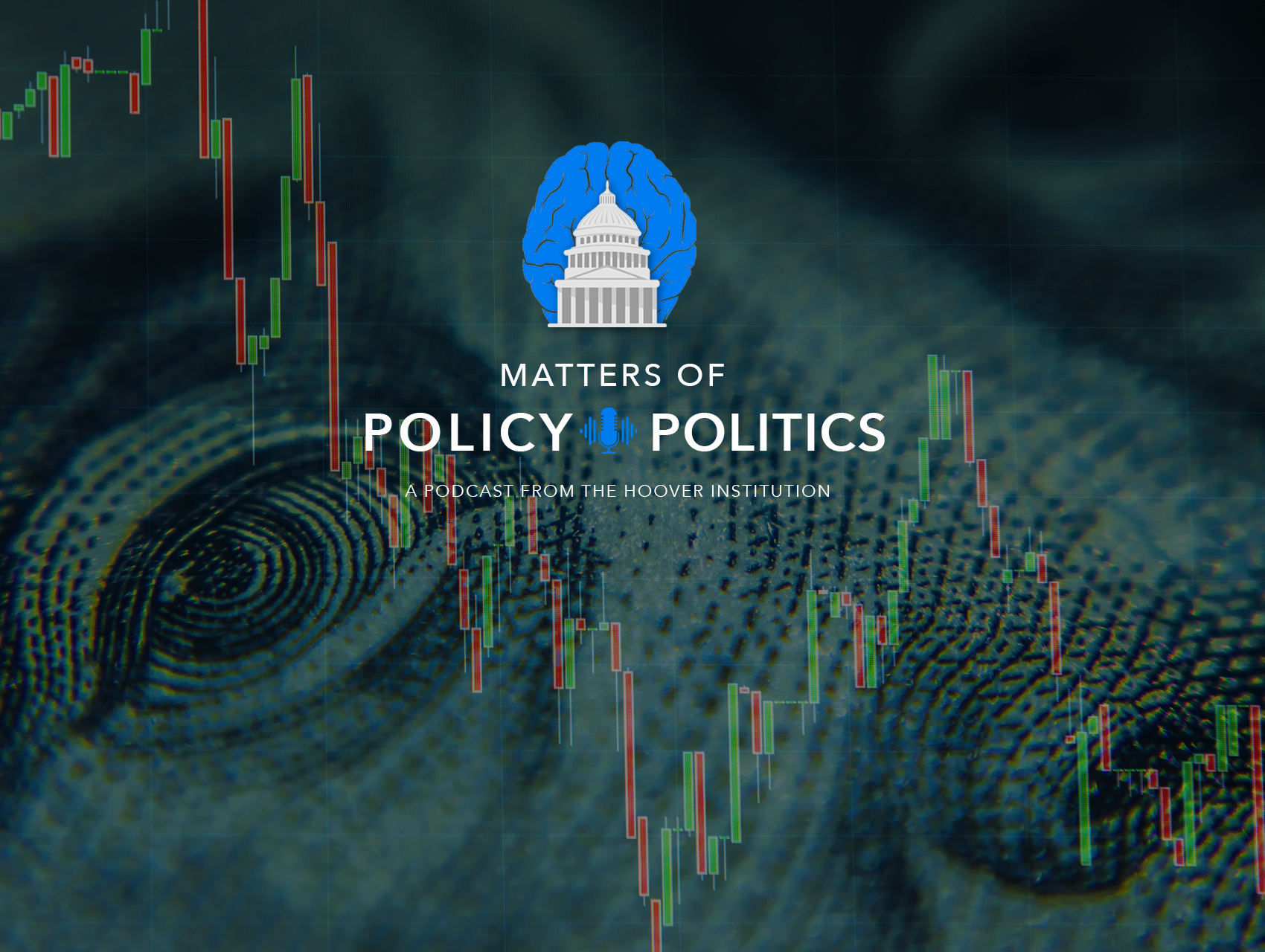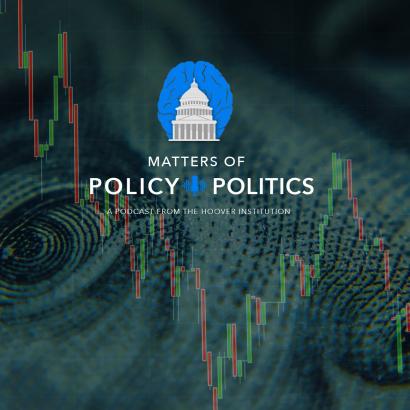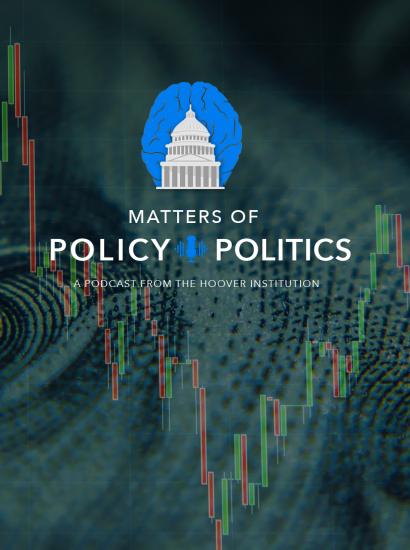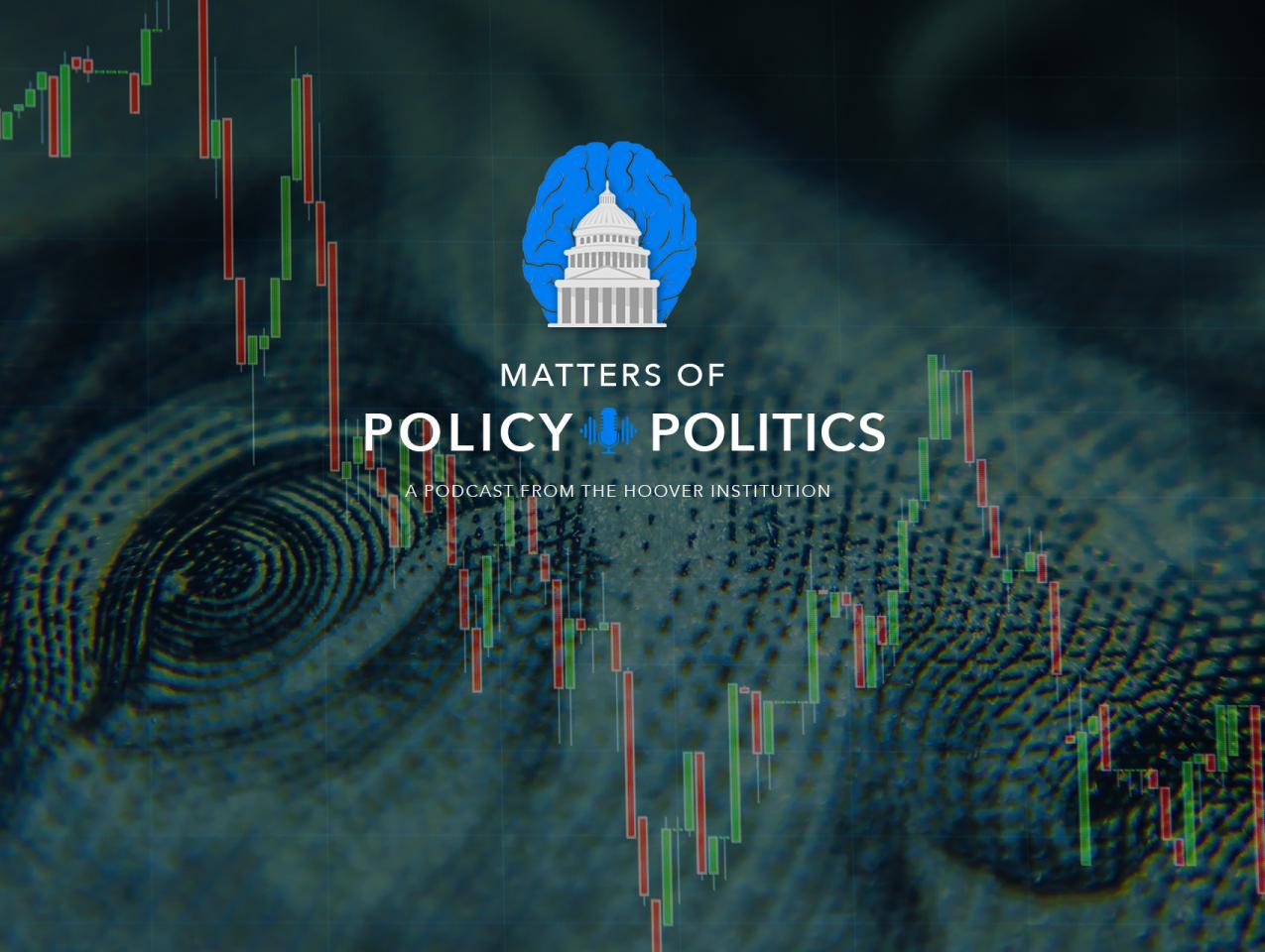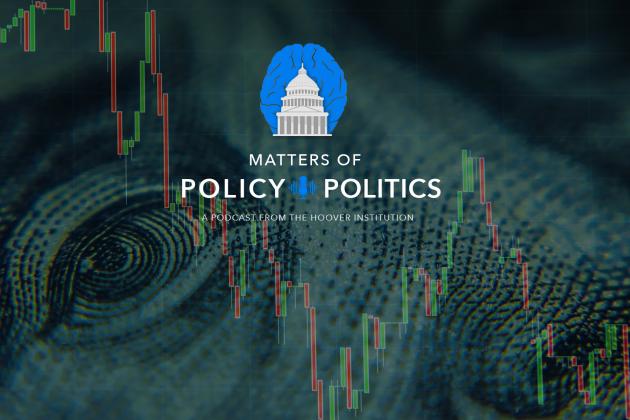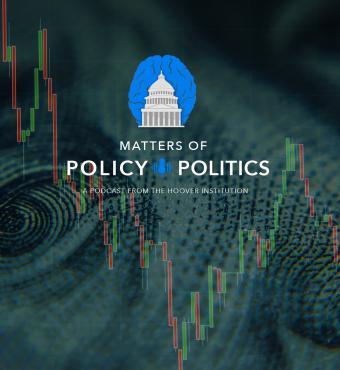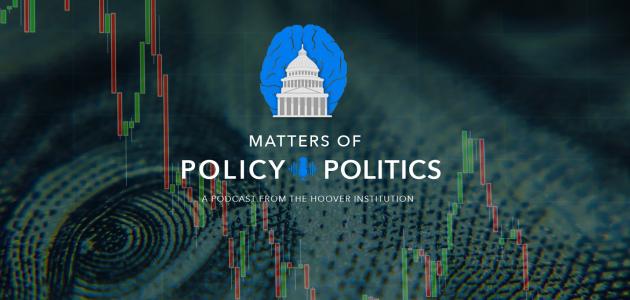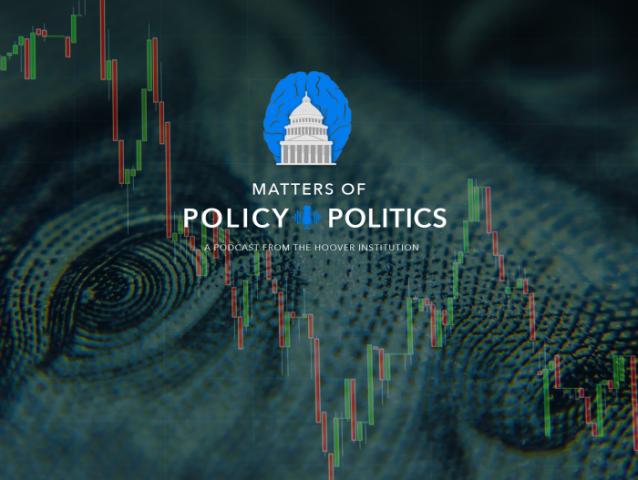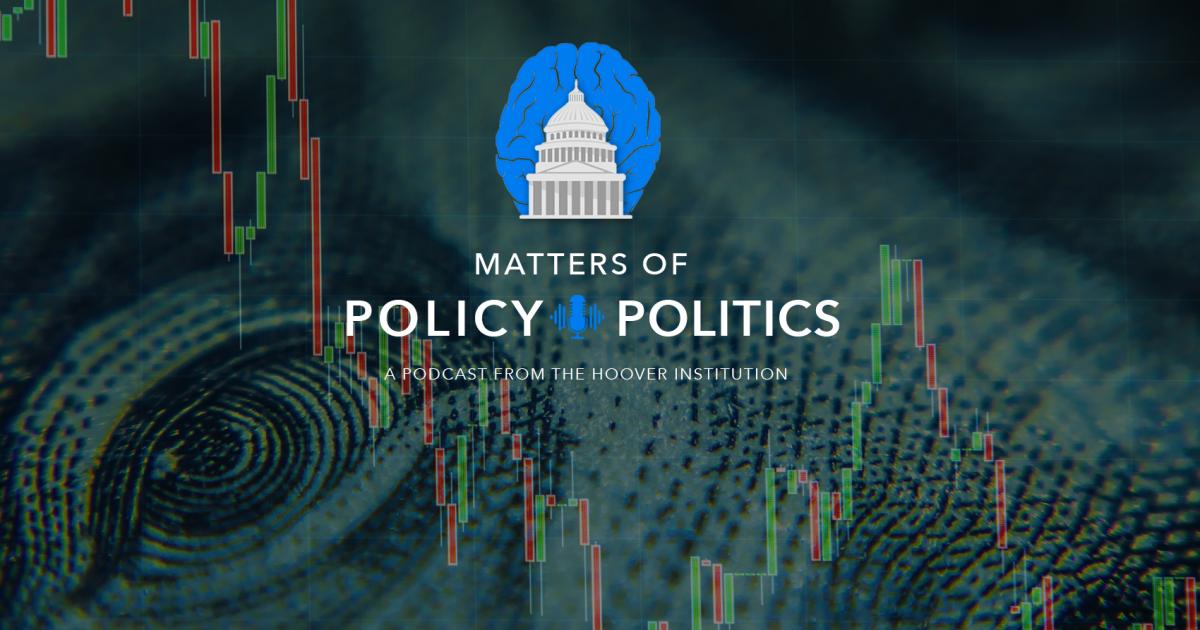What are we to make of the debt-ceiling drama in Washington and why is there a need for the Federal Reserve to engage in greater self-examination? John Cochrane, the Hoover Institution’s Rose Marie and Jack Anderson senior fellow and a recipient of the 2023 Bradley Prize for his contributions to the study of economics, reflects on lessons learned from inflation, institutional drift, and the art of economic storytelling.
>> Bill Whalen: It's Thursday, May 18th, 2023, and welcome back to Matters of Policy and Politics, a Hoover Institution podcast devoted to governance and balance of power here in America and around the world. I'm Bill Whalen, I'm the Hoover Institution's Virginia Hobbs Carpenter Distinguished Policy Fellow in Journalism. But I'm not the only Hoover fellow podcasting these days.
I encourage you to go to our website, which is hoover.org, and check out our podcast yourself. Click on the tab at the top of the homepage, it says Commentary. Head over to where it says Multimedia, and then Audio Podcasts, and you'll see 17 of them in all. One of those podcasts is actually the audio version of the GoodFellows broadcast that we do every other week.
I mentioned that because one of the stars of that show, John Cochrane, joins us today. John Cochrane is the Rose-Marie and Jack Anderson Senior Fellow here at the Hoover Institution, as well as a research associate of the National Bureau of Economic Research and an adjunct scholar of the Cato institute.
John's most recent book, his magnum opus, really, is The Fiscal Theory of the Price Level, which explains how government deficits and debt drive inflation. Earlier this week, John Cochrane received a 2023 Bradley Prize for his contributions to the field of economics. In the words of the Bradley Foundation that awards the prize, quote, his astute analysis of current economic issues such as inflation, the national debt, and fiscal policy.
The Bradley Foundation adding, quote, John makes even the most theoretical economic concept accessible and understandable by applying a combination of wisdom and wit to his work. John, thanks for coming on the podcast. I hope I've not set the bar too impossibly high for you now.
>> John Cochrane: Well, that was certainly a wonderful introduction, and certainly the Bradley Prize was a huge honor.
>> Bill Whalen: Let's talk about the Bradley Prize. Explain a bit to the audience what exactly it is.
>> John Cochrane: The Bradley Prize is given out by the Bradley Foundation annually, a couple of recipients, honoring both academics, public intellectuals, and people active out in the world who don't just talk about stuff but go out and do stuff.
When I heard about it, I couldn't believe it, because when you look at the list of previous prize winners, including our own John Taylor, for example, it's full of really remarkable people. So I was very honored to be part of that club, and I'll say inspired, too. When you write, you don't really know that anybody's listening, especially in public policy things, which those writings are ephemeral.
So to learn that the Bradley Foundation and its board, at least, was listening and I had made some impact, was really heartwarming and inspiring. I have projects that do much more of this sort of thing and it really, to know that people are listening and care really makes a huge difference for me.
>> Bill Whalen: And that's the key word, John, impact. You do a blog called The Grumpy Economist and you post, and of course there are tens and tens of hundreds of comments about it and you probably have to filter some of those comments at times. So people clearly read what you write.
But the question when you do write a lot prodigiously, is you actually make a difference. So the Bradley Prize is affirmation of that. I know, by the way, on the Hoover side, Peter Berkowitz is a Bradley Prize winner. The historian Andrew Roberts, Ayaan Hirsi Ali received one in 2015.
She is, of course, Mrs Niall Ferguson. So maybe you and the Fergusons can go out to dinner and tease Neil about that if you want. Richard Epstein won one on the economics front, John Taylor in 2010, Gary Becker in 2008. John, so you are certainly in special company.
One thing I would point out is that nothing comes free and your prize actually required you to have to go to Washington DC to pick it up. And I actually saw a very startling image. That was my friend John Cochrane wearing a tuxedo.
>> John Cochrane: I actually own a tuxedo.
You wouldn't believe it. Ashamed to discover I put on a few pounds since the last time I used it. I bought the tuxedo cuz after about the fifth University of Chicago Nobel Prize event where we were required to rent tuxes, I said, well, what the heck? And went out and bought one.
>> Bill Whalen: You looked good, though, John. I couldn't decide if you looked like Bond or you looked like a Bond villain. But then it occurred to me, economists are never Bond villains. It's always like chemists and physicists and really disgruntled scientists.
>> John Cochrane: That's a good point. Well, Bob Lucas once said, you do good as an economist if you make everyone in the world one penny better off.
And maybe our capacity for harm is similarly limited.
>> Bill Whalen: I want to mention your friend Bob Lucas, who just passed away, sadly. But just tell us a bit about what you said when you received the prize. I saw a couple snippets online, only like 10, 15 seconds each.
But what was the gist of your comments?
>> John Cochrane: So there is a prize speech which will be available soon by video. Bradley Foundation wants to clean it up a little bit, and I'll also post the entire text. I took this as an opportunity to distill 15 years of popular and economic writing into 7 minutes.
And I hope I did as well as the pitch for my next book. So I tried in seven minutes to say, what do I have to say about how to clean up the American economy? Short version is we pay attention to all the wrong things. The most important thing is long run economic growth that has slowed down remarkably.
I think that can pick up again, when you look at the numbers. Long run economic growth just dwarfs absolutely everything else we talk about. And I think a lot of the problem is, as I put it, we have the ideas, we have the investment capital. We just can't get the permits.
And I outlined some of the ways that we can fix many of the things that are broken in the US economy.
>> Bill Whalen: You mentioned Bob Lucas. Robert Lucas, the economist who just passed away a couple days ago. Tell us a bit about Bob Lucas. He was an economist, also kind of a mentor of yours, right?
>> John Cochrane: Absolutely. Bob Lucas was, first of all, within the field of economics, the most important macroeconomist of the 20th century. You don't hear about him that much because unlike Friedman and Keynes, he wasn't a big public intellectual, didn't advise policy, and didn't have Friedman's impact on free markets and that sort of thing.
But within economics, Really, everybody to this day does things the Bob Lucas way. So just a giant that way, but also a lot of what I posted about. So I have two blog posts. So one is a couple of personal recollections, and another is an attempt at some of the most important ideas distilled for people who don't like equations and use words like general equilibrium and dynamic and stochastic every day over breakfast.
Bob was a tremendous, warm, personal guy, a tremendous colleague, a tremendous helper of young people, and he really had an impact on me in that way. He sort of handed me my first big paper on a platter, and my job was to understand what had just been handed to me and to go do it.
So thank you, Bob. I would not be here at the Hoover Institution, that set my career going. But he also, another thing that I loved about him was he couldn't abide bullshit. And I learned that about Bob before I even met him. It was one of just minor essays that I wrote where he got a little bit annoyed at some policy essays.
In the Bob Lucas Pantheon, this is nothing, but it was an attitude. There's a lot in economics about blah, blah, blah, blah, blah, blah, blah. Bob was, no, you have to think clearly, tear your models down to what really counts, and be honest. That intellectual, honestly, and not abiding by political stuff either.
Not abiding by what's popular with your team these days. We're just gonna do really brutally honest economics. That personal characteristic, as well as his warmth and beautiful insights, that was really important to me, and I felt the need to write about that.
>> Bill Whalen: I don't know, John, if you saw the New York Times obituary of your friend, but I read it and there was a passage here that caught my eye.
And here's what the Times wrote, quote, in a 1988 speech titled What Economists Do, Professor Lucas explained, quote, we economists have to be storytellers. We do not find that the realm of imagination and ideas is an alternative to or retreat from practical reality. On the contrary, it is the only way we have found to think seriously about reality.
Is that how you approach economics John?
>> John Cochrane: Yeah, I call what we do quantitative parables. Economics is complicated enough that if you just try to write beautiful prose, you go around and round in circles. And you forget to tie up the fact that when Bill Whalen bought a new vest, somebody else, he had to spend less on something else.
You can forget about getting all the markets right, getting the budget constraints right. You have to do them. You have to write models. They have to be mathematical, because we just are not capable of making sure that the logic of our prose is right. But you also have to simplify.
When you write a model of an airplane wing, we know those laws, and you write it down, and you write it as realistic as you can. Economic models, we still aren't totally sure of the ingredients. We don't know when we put Bill Whalen in a model, we don't know exactly what he likes to buy.
So the reductionist approach of throw everything in the pot in and stir and see what comes out will not work. Instead, the point of a model is to make sure that the story surrounding it is coherent, but you have to understand how the model works. This is how AI will never penetrate economic models, because AI sort of works to predict things, but nobody understands how it works.
A successful economic model, it has to be quantitative. And Bob really pushed that. You don't just say, well, up down, you have to say up, down by 3% or 5%. And it has to be mathematical, it has to be rigorous, but it has to be stripped down to tell the story in a digestible and understandable way.
I've spent a lot of my time, my fiscal theory of the price level, is really about staring at simple equations and saying, what's the story they tell? Bob was a master at that, both at stripping down the models and explaining what the models really meant.
>> Bill Whalen: Now, John, you just came back from Washington, which is awash in drama right now that has to do with the debt ceiling.
The president of the United States traveling to Japan earlier today, Republicans crying foul, everybody mugging for the cameras, doom and gloom, disasters around the corner. And we seem to be bogged down now in the debate over the merits of the 14th Amendment, John, Section 4 in particular. Let me read it to you, and I want to get your thoughts on this as a way to get out of this, because I think I know what you're gonna say.
The Section 4 of the 14th amendment reads as follows, quote, the validity of the public debt of the United States authorized by law, including debts incurred for payment of pensions and bounties for services and suppressing insurrection or rebellion, shall not be questioned. Laurence Tribe seems to think this gives the president United States power to make debt payments regardless of debt limits put in place by Congress.
What does John Cochrane think?
>> John Cochrane: Well, I want to try to avoid the legalistic thing. The United States has defaulted on debts before. So in 1933, the government debts included a gold clause that said, you can get your money back in gold. And the Roosevelt administration said, no, you can't.
And the Supreme Court backed them up and said, you constitutionally can do that. But let's talk about the economic issues. I believe it is within the legal power of the administration to say when the debt ceiling hits, our approach to this will be that we will pay interest and principal on maturing treasury debt and we will not pay other bills.
And I think this is, from a policy and keep America's institutions strong, exactly what they ought to do. I think Alexander Hamilton will roll over in his grave. I think he already is rolling over in his grave that they are even talking about doing anything else, and I think that is what they will do.
But I am shocked that a treasury secretary would say in public anything but, on my watch, we repay treasury debt, even though it's held by Wall Street fat cats and Chinese central bankers. The full faith and credit of the United States debt is coming first and everything else is gonna be later.
Because it is only this great reputation for paying debts that allows the US to borrow when we really need to. And when China invades Taiwan, we're gonna need to borrow a bunch of money. We want people to really believe that money is going to get repaid no matter what.
And putting that reputation gained over 200 years, 250 years at risk in order to this kind of a manufactured crisis here to say, you Republicans had better give in and go on with our huge spending plans because we're holding the dead cause. I find that shocking that that's what's going on.
But so legally, I'm not an expert, but I believe they can do it. And as a matter of economics and just morality and defense of American institutions, I believe they ought to do it. And what's going on is that they are deliberate. Every sides are trying to make the debt ceiling into a bigger crisis to force the other side to give way.
>> Bill Whalen: So what does this bode, John, for when there's an honest to goodness crisis with regards to entitlement, Social Security, Medicare.
>> John Cochrane: Yeah, so this is not the great debt crisis that's coming. There is a great debt crisis when the US says we need to borrow $10 trillion to bail everybody out again because there's been a financial crisis.
And we still haven't resolved Social Security Medicare, so we don't have any plan for paying it back and we kind of look like Greece. That event could come. This is not that event. This is a technical default. And in a sense I think what will happen, the worst that would happen, what most likely will happen is they will continue to pay interest and principal on treasury debt and postpone other payments.
What is less likely to happen is that they delay interest principal on treasury debt, but you'll get it eventually. So this is not by itself the great debt crisis. And in fact, let me defend, what's going on? The budget process is completely broken. Every reasonable government, tiny governments, set an annual budget and say, okay, here's how much we're gonna spend overall and here's how much we're gonna tax overall, here's what we're gonna borrow overall.
Now within that spending, then we're gonna appropriate bills in regular order and obey the spending limit. That process is completely broken in the US. So the debt ceiling threat is the only time that both sides sit down and sort of face the music on the totals. And it's a very third best solution.
But it's better than nothing, which is just spend like crazy with no budget whatsoever. And that's necessary. I mean, we've got to solve the long run spending problem before the great debt crisis happens.
>> Bill Whalen: Right, a favorite concordance of mine, by the way. I believe it's words, the extent of dropping money out of a helicopter.
>> John Cochrane: Well, that's actually Milton Friedmanism, but I'm happy to appropriate it.
>> Bill Whalen: Call it a Cochranism for now. Do you see yourself saying that anytime in the near future, or do you think we've moved past the days of $5 trillion?
>> John Cochrane: No, I think I am shocked that we're still doing $1 trillion deficits.
So deficits are fine. The US, if you have a temporary emergency, like a war, like a financial crisis, it is right for a government to borrow money with a clear plan of how it will be repaid by slightly higher taxes or slightly lower spending over time. But we are now not in a crisis.
COVID is over, unemployment is 3.4%. The war in Ukraine is a war, but it's not very expensive by US government standards. There is no excuse for a trillion dollar deficit right now. And what I worry about is where's our borrowing capacity when the true danger comes.
>> Bill Whalen: Let's go inside the world of Hoover for a minute, John, and that is the Hoover Monetary Policy Conference that was just last week here on the Stanford campus.
The 2022 title of this conference, John, was How Monetary Policy Got Behind The Curve- and How to Get Back, 23 title, John, How to Get Back on Track, get back, two years in a row. What are you guys saying?
>> Bill Whalen: You guys, being Hoover's economists, by the way, this is a creation of John Taylor, and I know you're involved in the annual conference planning.
Maybe explain a bit what the conference is, and let's get to that phrase, get back.
>> John Cochrane: It's a great annual conference, and it is a testament to John Taylor's convening capacity. We bring together academics, industry people, media and Federal Reserve officials and Federal Reserve staff to spend a day talking about monetary policy and where it's going here at Hoover, away from the annual, from the pressures of the day.
And I think it's been a great success. It's also been a great success in that it's been a series of conferences, it's built a reputation. John makes everybody write down what they said and publishes an annual book. So there's a record of where we are, videos, and we will soon have videos and stuff which I think we both would be very interested to watch, so that's the series benefit.
Now the question. Last year's conference, I think, was actually quite influential. We had inflation, and the Federal Reserve had, quite contrary to Taylor's rule, left interest rates alone. And the basic thrust of the conference was John Taylor saying, guys, what are you supposed to do when inflation goes up?
You're supposed to raise interest rates, which they promptly did just about. I don't want to grant us the influence, but I think that was very important.
>> Bill Whalen: One of the speakers drawn was Philip Jefferson. He's been nominated to be the Fed's vice chair. What did he tell the audience, and how did you take it?
>> John Cochrane: Jefferson was great, what I loved about Jefferson is he started with by attacking, not attacking, by politely, God, the guy is polite, politely questioning the premise of the conference. What do you mean, back on track?
>> Bill Whalen: He did his homework.
>> John Cochrane: He said, we're doing just fine.
Whether or not we were a little slow last year, he laid out the Fed's thinking on why they are exactly at the right place now, and we'll see if he's right or not. So certainly, and he also announced his appointment as vice chair of the Fed, and he did a great job of judicious central banker speech.
I want to point to two things that I thought were very significant at the conference. The two sessions, well, the whole thing was great, which I highly recommend, but there was a first session on the Silicon Valley Bank collapse and the related bank collapses. And a second session on how did inflation forecasting gets it wrong, and whether or not monetary policy is on track right now, we have to face the fact that the Fed had two major institutional failures.
The Fed wants 2% inflation, it got 8. Didn't see it coming and didn't see what it was when it was smacking it right in the face. That's an institutional failure. That's like you're the admiral at Pearl Harbor and the Japanese Zeros come in, we gotta talk about how that happened.
The second, of course, with the wave of bank failures we're having now, which there's no toxic mortgages and derivatives and obscure, deregulated whatever. This was plain old interest rate risk and run prone deposits, the sort of thing that we've understood since about 1720, and yet the regulators completely missed that.
That, too, I call it an institutional failure. The people in the Fed are smart, they are honest, they are hardworking public servants, yet somehow this institution missed its two biggest tasks, inflation and plain vanilla bank regulation. And the thing I'm a little shocked, that is, there is not any appetite for a how did we go wrong, not even an internal inquiry.
The military, our friend HR McMaster. You lose a battle, and there is at least an after action report on what the hell went wrong, guys, and how do we fix it. And that is not happening. So those two sessions I thought were extremely important, at least in opening the conversation, we must talk about how this went wrong and how we fix it one way or another.
Because, again, it's not just the evildoers and the deregulators and the whatever. It is very smart people, dedicated people in an institution where the structure of the rules is what went wrong in Silicon Valley Bank. And I don't know what went wrong, Mickey Levy had a great paper on what conceptual things went wrong in inflation forecasting.
So I think teeing up those two questions are actually the most important parts of getting back on track, not just our short term interest rates, where is short term interest rates relative to the Taylor rule that we spend a little too much attention on, that's what Phil Jefferson talked about.
>> Bill Whalen: So I said on a couple of sessions, John, I remember you asked that very question to the panel, just why doesn't the Fed really examine itself, and that's a great question, John. Why doesn't the Fed examine itself? Or perhaps more to the point, where's Congress? Congress is of course, obsessed with checking COVID and where COVID came from and why we just chose what we did to do in COVID.
Why isn't the Congress reexamining what the Fed did?
>> John Cochrane: Well, I think direct congressional hearings on monetary policy and financial regulation aren't necessarily gonna be a great idea because-
>> Bill Whalen: Not gonna get a lot of live coverage on Fox, is it?
>> John Cochrane: Well, but I do think the right mechanism is the bipartisan commission, the inquest, and the Fed should be heading that off immediately with an internal, how did we get it wrong?
Would be a great way to head off. Look, Fed, I hope you're listening, if you don't want what you regard as those yahoos from Congress hauling you down to say, where's the gold standard, why don't you clean your own house first? I suspect, now here, this is deeper in, and maybe I'm a little too cynical, but Washington is right now a collection of cover your butt institutions.
Where is the CDC's internal reflection on how did we screw up COVID so wrong? Where's the FDA's internal reflections on how did we screw up COVID so wrong? Where's the FBI's internal reflections on how did we screw up the Trumpgate so wrong? That's not the way Washington works.
You maintain the prestige of the institution above all else. That's a guess. People I know at the Fed are asking these questions, but there's no institutional, how did this institution get it wrong?
>> Bill Whalen: Yeah, John, there used to be a time in American journalism when great newspapers had what they called ombudsman.
And the ombudsman would have a column and the ombudsman would criticize the newspaper openly if the ombudsman thought the paper had done something bad. The Fed, I guess, doesn't have an ombudsman, someone who can sit inside internally and kind of monitor what's going on.
>> John Cochrane: As far as I know, it doesn't.
And it has something I've thought about for a long time, again, I learned lessons from HR, this is the great thing about being at Hoover, you learn from people in other fields. The military makes a battle plan. They understand Mike Tyson's advice about how long battle plans last.
>> Bill Whalen: Till you take a punch to the mouth, right?
>> John Cochrane: They do a lot of contingency planning. Well, if they come over the right wing, right flank. What happens if they come over left? The Fed tends to say, here's the forecast, here's what we're gonna do and does not either think about contingencies.
Well, if x, then what? If y, then what? And it doesn't have a systematic red team. Military planning, Weyland might be assigned, okay, you're the red team this time, what's wrong? Where are we falling prey to groupthink, at least you want to listen. Maybe the red team's wrong, but you want to listen.
The institutional rewards for being red team are not high at the Fed, and you need to have the red team and listen to it and prize it. We talked about this at the conference, especially in Mickey Levy's session on inflation forecasting. Institutionally, what's going wrong with inflation forecasts and how can we make them better?
Well, a red team might be a good one. Steve Davis pointed out that the forecasts are also used to shape expectations. We all understand that if everyone expects inflation, there's going to be more inflation. So the Fed doesn't really wanna say, there's a strong incentive not to say, whoa, whoa, whoa, here comes 8% inflation because then everybody will raise their prices today.
Well, now you have a big conflict that these are the kind of institutional changes that you ought to think about, that I hope the Fed will at some point think about. And this really, I wanna highlight this aspect of the conference as opposed to the where the interest rate's going, because those are the really deep questions that we get to ask at these conferences.
>> Bill Whalen: Right, well, interest rates are in the news this morning, John. Lorie Logan, she's the president of the Dallas Fed. She said words to the extent that she doesn't think that data points justify skipping a rate hike in June. What's your sense, John, is what the Fed's gonna do when it meets in June?
>> John Cochrane: I think short-term bets on where the Fed goes is not a specialty of mine, that's why I'm not a bond trader and I still have to work at Hoover for a paycheck. I think, in the larger sense, we know exactly how the Fed is going to work.
The Fed is one of the more predictable agencies. If they see inflation not easing, they're gonna keep raising rates. Here's how the Fed thinks about the world. We raise rates, that cools the economy, and by some Phillips curve magic, cooling the economy lowers inflation. That may not be right, but that's how the Fed thinks about the world.
So the Fed wants to see the economy cooling and it wants to see inflation going down and kinda like driving down the road. So is the Fed gonna bump the steering wheel left or right this time? I don't exactly know, but we know where it's going and that it's going to try.
As long as inflation is not trending downwards, they're gonna keep raising rates. So good luck to us. Well, until they are trying to induce a little bit of recession. And when that gets a little bit out of hand, then they're going to back off. And so that's what they're gonna do and it's fraught.
Interest rates' power to cool the economy and cool inflation is much weaker than most of us think and I think much weaker than the Fed thinks. So right now, we're kind of point, the medicine seems not to be working. Labor markets are still incredibly strong and we may come to an interesting moment when the Fed realizes that the medicine isn't working in that way.
>> Bill Whalen: I wanna take you down to an alternate universe in which John Cochrane has been nominated to be the chairman of the Federal Reserve, and you're smiling. I'm not sure if John Cochrane lives to see that day. Your wonderful wife, Beth, may kill you because that would mean disrupting the great life you have in Palo Alto, Montello, and Tahoe.
But let's play along for a second here and you're going to Washington to be confirmed as the Fed chair. That means that some minion like me, John, is tasked with digging into John Cochrane's past. You know where they're gonna go first, John? They're gonna go to The Grumpy Economist blog, and then they go through every darn thing you've written, and they're gonna land John on February 19th, 2012, and the following.
It's the title of it is Fed Independence 2025. And here's what the grumpy economist John Cochran asked. Quote, what will the Fed look like in 2025? How long can it stay independent as it takes on more and more power and uses that power for political policy actions? John, that is 11 years and 3 months ago.
Would you like to update that to 2023?
>> John Cochrane: Yeah, I believe in an independent central bank as a great institution. It's a pre-commitment mechanism. The government would clearly always like to get interest rates low before a recession. And we have constitutions and we have independent central banks for a reason, which is we want to pre-commit ourselves against doing stuff like that.
So an independent central bank is a great institution, but not too independent. You don't want to, if they're completely politically independent, then they go off and whatever crazy thing gets in the head of the central bank chair, the central bank goes and does. If they wanna subsidize black vest production, that's what you got around today, then they go do it.
We don't want that, and so we have this balance. Part of an independent central bank is we give them a mandate, inflation and employment and financial stability. And part of that mandate means and nothing else. It's not what you should pay attention to that's important in there, it's what you should not pay attention to.
So that's a great system and worth persevering, but everything in Washington is political. Now, that column was written in a particularly grumpy moment. And what I was grumpy about was admittedly small, but to me, shocking instance of political action by the Fed. And the part that got me really mad at the time, if you recall, there was a robo-signing scandal.
Where banks had, since the volume of foreclosed mortgages was so high, they weren't filling out all the paperwork in the proper dotting I's and crossing T's. A bunch of attorneys general went nuts about it and extracted money out of the banks. And to my shock, surprise, the Fed went up.
And what the Fed did was used its supervision power, its safety and soundness supervision, to say that as punishment for the banks doing this, it was going to go along with the attorneys general and impose regulatory sanction. Now, nothing about what the banks did was unsafe or unsound.
They foreclosed on some mortgages, which was politically unpopular, of people who weren't paying their mortgages. And it didn't fill out all the paperwork, but there was nothing that threatened the bank's safety about this. And it went along and forced the banks to enter an agreement that did not give money back to the people whose mortgages had been foreclosed.
But gave money, among other things, to community groups who are largely engaged in partisan political advocacy. So the Fed forced banks to give money to political actors. That just struck me as, now, it was small, but it was shocking. So where are we today? The Fed is very political, and to some extent it has to be, because, of course, Fed chairs get reelected.
I actually admire how Jay Powell has navigated political waters. I think if I were Fed chair, I would be fired within a week, I don't have that skill. How he has gotten reappointed by a Democratic president, how he has navigated, especially the current demand of the Fed, is that it uses its awesome power to force climate policy.
And I hate to call it climate policy, cuz it's not gonna do any good for the climate, but to defund fossil fuels and force all sorts of green subsidies on the financial system. And he said, no, I'm not, but we're gonna study it, and just navigated that whole thing fairly, brilliantly, given the political realities.
The Fed is, the banks are very popular in Washington, DC, and one of the other things I'm mad at the Fed about is that they quash narrow banks. So narrow banks are banks that take your deposits and put them in reserves at the Fed, that bank can never run.
No financial crisis ever again if we had narrow banks. What's the Fed doing about narrow banks? What it should be doing then, is giving them gold stars for systemic safety and saying, thank you for helping the country to avoid financial crisis. What it's doing is stopping them from operating because they threaten the profitability of the big banks.
That's not so good either. It's easy to say, a shame, a shame, a shame, but we live in such a partisan political environment, and the Fed has to keep going. That is the world we're in, and not a world that I think you or I would like the Fed to be in.
Again, I'm not gonna scream bad individuals, cuz everybody I know, including Jay Powell, who plays this game, is playing the best hand they have in a game with some pretty rotten rules. But it is one where our Fed has become quite political and only better than most of the other central banks.
>> Bill Whalen: Let's talk about what a Cochrane standard, let's call it, for what's sort of inbounds and out of bounds for the Fed, John. I'll point you to October 2020, the Federal Reserve Bank of Minneapolis holding a forum. The title of that forum, John, Racism in the Economy: Focus on the Wealth Divide.
>> John Cochrane: Yeah, well, that's an example of a, I mean, I think, lack of opportunity for Americans who are less fortunate, which happens to include a lot of minorities, is a very important issue, but it's not the Fed's issue. The Fed has a limited mandate. Maximum employment does mean everybody.
The way you get maximum employment is by especially increasing employment among people who don't work a lot. So that would be great. Recognize, however, the Fed's limited tools. So the Fed moves interest rates around. Now, if you want to talk about why so many Americans don't work, maybe we should start with the fact that from about $0 to $60,000, if you earn an extra dollar, you lose a dollar worth of social program benefits.
No maximum employment, dear Congress, fix that one. The Fed has no power to fix that one. So I think this is an example of the Fed trying to play political. I think it's a dangerous one. I think this is why I might be fired. This is an important social issue.
We have nothing to do with it. Chris Waller I want to flag as being really courageous. He has said as far as climate, climate change is an important economic issue. It is an issue that plays out over decades, and it has absolutely no impact on financial risk of the kind that the Fed can do anything about.
He didn't say this, but I would. We can't see plain vanilla interest rate risk staring us in the face. So good luck that you're gonna think the Fed is gonna do something about risks to sea level rise 50 years from now. It just doesn't have the institutional competence or the mandate to do it.
So we all sort of have, this is part of, lots of companies are virtue signaling politically. I think this is gonna come bite the Fed in the butt because we still have elections in the US and people are gonna be very mad about this when those political winds change.
>> Bill Whalen: John, the Fed is the result of the Federal Reserve Act of 1913. That is 110 years ago, to use some very Washington verbs. Does the Fed need reforming? Does the Fed need fixing?
>> John Cochrane: Yes, in the sense that all institutions need reforming and fixing in American government.
I mean, all of the institutions of our government have suffered mission creep and bloat. The Fed is no exception. I actually might start at the financial regulation part, we keep adding rules and we never clean them out. The entire system of government needs a Marie Kondo to go after it and start with the sock drawer.
Heavens to Betsy, the garage is waiting for us. And the Fed, especially in its financial regulatory role, needs that. I do think fundamental reforms are good, but the problem with fundamental reforms is you need a constitutional moment to do it. You need a moment where you can sit down and write the rules of the game.
And we understand, look, you'll be on top sometimes, I'll be on top sometimes. So let's write the rules of the game so that this plays out well. Right now is a poor constitutional moment for Americans, because every time we talk about changing the rules of the game, you can see both sides are, how can we get a very short run advantage of this?
We talk about how do we change the number and tenure of Supreme Court appointees. Well, that's just about how do we get more Democrats appointed. So you need to make those constitutional changes when you can have a moment of relative peace and not be looking at just the short run advantage.
So I'm not sure it's a wise moment to reconstitute that, but I think the Fed should be doing this internally. Good way to start is the Fed is one of the best run institutions in government, which just tells you something about all the others, but it certainly can consider its own internal reforms and ought to do so.
>> Bill Whalen: What about the Fed creating, John, an outside body, if you will, Hoover economists, other economists to sit down and perhaps write recommendations for the Fed?
>> John Cochrane: That's a great idea. The Fed, one of the problems is there's a lot of a closed loop by the bubble and not much career incentive for speaking out within the Fed.
Consensus is a good thing in some sense. You communicate better if you're not squabbling with each other in public. But then consensus leads to groupthink too. So that's part of what's good about the Fed, I should say. The system of, why do we have these regional banks? Well, the regional banks have been important historically as places where dissent could bubble up, where red team reports could happen.
Jeff Lacker could come in every time and vote no. The Minneapolis Fed could support a bunch of total heretics on monetary policy, and similarly. You mentioned that what if John gets appointed Fed chair? I would certainly want at least a kitchen cabinet of outside people to tell me, you're wrong.
I could ignore them, but only after listening to them.
>> Bill Whalen: Well put. Among other Fed reforms, John, if you were appointed a governor to the board, I believe you get a 14 year term. You're appointed chairman or vice chair, you get only four years. Should we perhaps give the chair a longer term?
>> John Cochrane: Well, there's good and bad to be said here. There's an element of shuffling deck chairs on the Titanic. It said, after every crisis, what do Americans do? We change the work chart. Sometimes institutions depend on people within them obeying the norms of the institutions. I think a lot of what we're seeing going wrong in America right now is that people are obeying the letter of the institutions, but not the norms of the institutions, and therefore destroying them.
If the norm is we understand the Fed is a independent, limited authority institution, we reappoint Fed chairs when they're doing that job, as opposed to we try to appoint someone who's gonna do our partisan thing on some policy today. Does it matter whether it's four years or eight years?
And if we're not gonna do that, does it matter if it's eight years rather than four years? I don't think so. You want independence, but we do want political accountability. The Fed has, here's a limit on the Fed. You want inflation, Fed wanted inflation for a long time.
What's the easiest way to get inflation, drop money from helicopters, right? The Fed legally cannot do that because it also legally can't come take your money. The most effective way to stop inflation is to come to Bill Whalen's house and hoover up all the money in his wallet.
Fed can't do that. Treasury can do that. Treasury's politically accountable, so you need political accountability. And you mentioned sort of climate and inequality. Well, the European Central Bank is kind of, it's much more insulated from politics and has gone much more down the, we are going to use our central banking powers to pursue specific kinds of green policy.
And I want to emphasize, not necessarily green policy is going to work. They want to subsidize electric cars, they want to divest fossil fuels. And right now, the politically accountable authorities in Europe are taking a second look at whether cutting off all the fossil fuels is a good idea.
So you don't want too much independence by central bankers. So I'm not sure I would start with changing the rules, I wanna start with getting back to the norms.
>> Bill Whalen: So, John, we're only five months into the new year, and this has already been arguably probably the biggest year of your life.
And that's your passion project, The Fiscal Theory of the Price Level has been published, and now you have a Bradley Prize in your pocket. I'm reminded of when the actor Colin Firth won his Oscar for The King's Speech. He gets up on the stage in his very understated British way and he says, I'm afraid my career may have peaked.
I'm not suggesting your career has peaked, John, but where do you go from here? Now you have your Bradley Prize and your book is out. You mentioned that you are working on another book or thinking about another book.
>> John Cochrane: Yeah, I hope my career has not peaked. I feel vital.
I'm full of projects ahead, which I think are always going to be better than the ones behind.
>> Bill Whalen: In the world of gerontocracy, John, you're still a young man.
>> John Cochrane: Well, in the world of academic economics, it's a young and highly technical game.
>> Bill Whalen: But what's next for you?
>> John Cochrane: Well, two things, The Fiscal Theory of the Price Level book is just a foundation. It's a structure on which you can build more realistic. And in particular, do we really know whether and how higher interest rates lower inflation? That question is really unsettled. So academically, that's sort of the next step for fiscal theory of the price level.
And I kinda laid out the Bradley Prize on my public writing, I think it's time to put 15 years of Grumpy Economist and op eds into one place and try to synthesize what the big lessons are. So that's where my academic and policy projects go. I hope those are even bigger successes than the last ones.
But I'm at least gonna keep trying for a while.
>> Bill Whalen: Here's another good use of your time, John. Keep doing the GoodFellow show, we recorded the other day, you were not on it. I think it was the first time in 107 shows you were not there. It was odd not seeing you on the screen.
>> John Cochrane: Yeah, well, I'm sorry I had to miss it. Bradley Prize scheduling was a little chaotic, and I'm especially sad I had to pull out. I look forward to the first time when I get to watch the show without knowing what's actually on it. So that'll be a pleasure this time.
And I'll try to keep up my track record of not missing shows.
>> Bill Whalen: We'll start a new streak, which hopefully means we'll be doing the show for another three years. And Niall Ferguson was lost, he kept looking for you, taking notes.
>> Bill Whalen: To listeners, this as an inside joke.
Niall Ferguson just loves to kind of ad lib and riff and go along and be free flowing. John Cochrane is very deliberative in what he says, and he takes copious notes throughout the show so much that it irks Niall.
>> John Cochrane: Niall doesn't understand that the rest of us are not as smart as Niall in the particular capacity of a historian.
Niall can listen to something and mentally go, okay, I want to make five points with sub point a, b, c. He can do that, organize it in his mind, and then deliver a beautiful and eloquent summary of his ten points. I can't do that. I have to write them down or I'll go but what was I saying?
And then back to point number two. So, Niall, give us a break, we're not all as smart and eloquent as you are.
>> Bill Whalen: Well, so you're trying to keep up with Niall. Imagine me trying to keep up with you and HR McMaster and Niall Ferguson, not easy.
>> John Cochrane: You are doing a great job, Bill, and you keep us from, we could easily go down rabbit holes together.
So you keep us moving, which is an important task.
>> Bill Whalen: Thanks, I appreciate that, John. Hey, thanks for coming on the podcast today, and congratulations for the Bradley Prize. And please tell your wonderful wife I was only kidding about you going to Washington.
>> John Cochrane: It was a great pleasure, and we'll see about that.
>> Bill Whalen: You've been listening to Matters of Policy and Politics, a Hoover Institution podcast devoted to governance and balance of power here in America and around the globe. If you've been enjoying this podcast, please don't forget to rate, review and subscribe to our show. And if you wouldn't mind, please spread the word.
Tell your friends about us. The Hoover Institution has Facebook, Instagram, and Twitter feeds. Our Twitter handle is @hooverinst, that's spelled @Hoover I-N-S-T. John Cochrane, brave man that he is, is on Twitter. His Twitter handle is @JohnHCochrane, that's Cochrane, spelled C-O-C-H-R-A-N-E. His blog, as I mentioned, is called The Grumpy Economist, you should definitely check that out as well.
Also subscribe to the GoodFellows Show, where you can hear John, Niall Ferguson, HR McMaster mix it up. We'll be recording a new episode at the end of the month, so make sure to tune in for that. I mentioned our website at the beginning of the show, which is hoover.org.
While you're there, sign up for the Hoover Daily Report, which keeps you updated on what John Cochrane and his Hoover colleagues are up to. That's emailed to you weekdays. You can also sign up for Hoover's PodBlast, which delivers the best of our podcasts each month to your inbox.
John, final word here, where can people find The Fiscal Theory of the Price Level?
>> John Cochrane: At Princeton University Press website, where right now there's a 50% off sale of its dramatically too high price. And you can also find associated essays on my website, just google John Cochrane. Find The Fiscal Theory of the Price Level tab, and the essays I recommend for lay listeners, cuz they explain some of the ideas without equations and apply them to current events.
And then, of course, go buy the book and impress your friends.
>> Bill Whalen: Yes, very good. And of course, when John's Bradley Prize award speech comes out, it will be in the Hoover Daily Report, another reason to subscribe to that. For the Hoover Institution, this is Bill Whalen. We'll be back soon with a new installment of Matters of Policy and Politics.
Until then, take care, thanks for listening.
>> Announcer: This podcast is a production of the Hoover Institution, where we advance ideas that define a free society and improve the human condition. For more information about our work, or to listen to more of our podcasts or watch our videos, please visit hoover.org.







